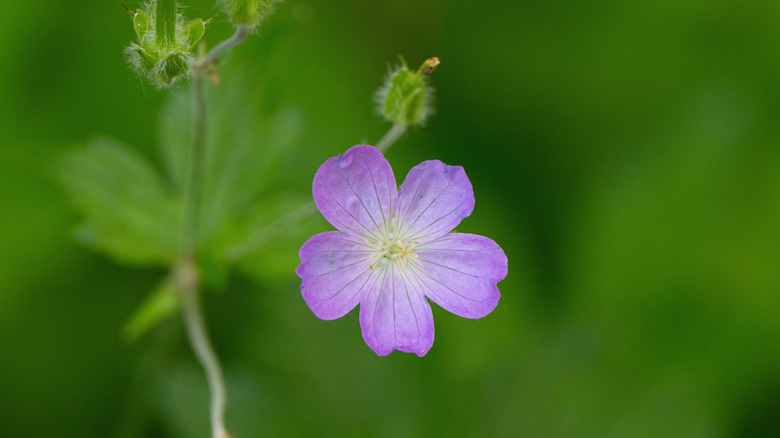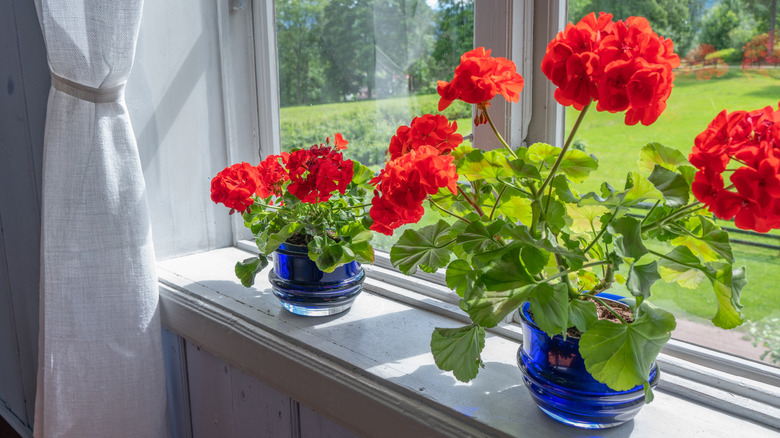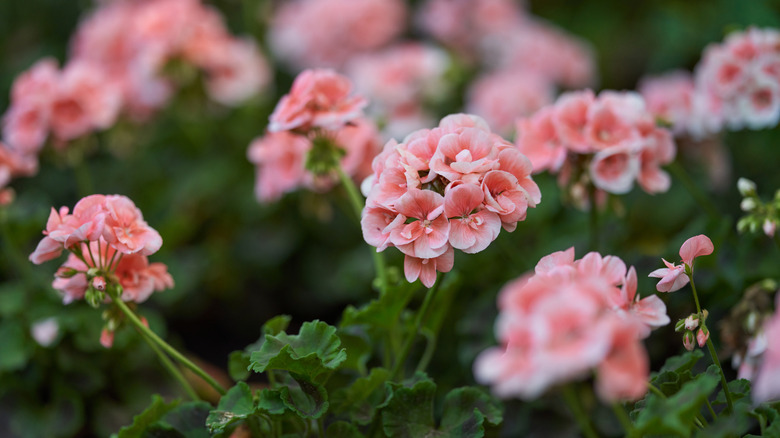The Best Methods For Overwintering Geraniums (& The Benefits Of Doing So)
A lot of calculus goes into deciding what plants fill your garden, from the aesthetics of layering foliage to whether you want to get in on the edible landscaping trend. One important detail to consider is whether you want annual, biennial, or perennial plants: annuals grow and die within one season, biennials last two seasons with a dormant winter, meanwhile perennials can last many years — either as evergreens or periodically shedding deciduous plants. But among the variety of potentially perennial flora, geraniums are a great choice. If you already have these flowers, you can care for them during the cold weather by saving cuttings, moving plants indoors, or covering them with mulch.
Geraniums come in many shapes, sizes, and colors. There are around 650 species of wild geraniums (Geranium maculatum) found all over the world that can be annuals or perennials, able to thrive anywhere from USDA hardiness zones 3 through 11. Garden geraniums (Pelargonium x hybridum) belong to the same family but a different genus, most being annuals that originate from South Africa. There are even four species of geranium unique to Haleakalā National Park in Hawai'i.
The most notable perennial varieties are also known as cranesbills, hardier plants that grow best in USDA zones 4 through 8. Even so, these geraniums can use some extra overwintering help to survive the cold months — and there are a few benefits to doing so, too.
What it takes to overwinter your geraniums
Overwintering helps to protect a plant between growing seasons, particularly flora not adapted to the cold, newly planted sprouts with less ingrained roots, or delicate flower buds on otherwise winter-hardy garden crops like strawberries. In optimal conditions, geraniums are a rapidly growing, low-to-mid maintenance plant that require well-drained, acidic or neutral soil and six or more hours of direct sunlight a day. However, they can survive with partial shade, or direct sunlight for only two to six hours, which is good for overwintering.
Fully grown geraniums can feasibly transition into containers and move inside. Insulating your flower pot with something like bubble wrap helps prevent breakage when exposed to the elements. Be careful, though: the root systems of plants in a container may become as cold as the ambient air, so it's worth using larger pots with packed soil, and trying to grow plants that can survive two USDA zones colder than your region.
No room for large pots? You could also try removing a 3- or 4-inch segment off the geranium's stem to overwinter some cuttings indoors. Dip the cut end into a rooting hormone before planting it in peat moss, perlite, or some other rooting medium. Keep your cutting moist (with appropriate drainage holes in your pot) and housed in a well-lit area with no direct sunlight for about six weeks, and once it is rooted you can move the cutting into its own container. Alternatively, you can overwinter geraniums by covering your garden in an insulating blanket of mulch. — go for a 2- to 3-inch layer.
How overwintering geraniums can help your garden thrive
There are many reasons to try overwintering your plants. You can save money and time by not having to sow new seeds every season, and the continuity of growth for an uprooted plant means it has the potential to become much larger — and give bigger and better blooms in the next season. Your garden may also visually benefit from the inclusion of unique plants not grown locally, so long as you can overwinter them well enough to be replanted the following spring.
Geraniums are a worthwhile addition to just about any garden, being very colorful flowers that are historically associated with happiness, health, and friendliness. Aromatic geranium leaves can be used in all manner of home goods like potpourri, and some use it as an astringent or even a headache cure. Whether you already have a set or are considering geraniums as a way to splash more color into your yard, perennial varieties are robust enough to survive winter with the proper care, and it's worth giving the process a shot.


